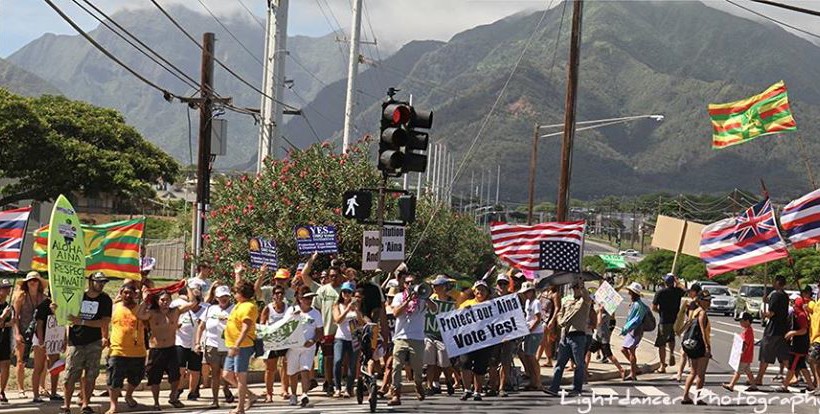By Jon Rappoport
December 5, 2014
Let me put it this way. It would mean a lot more than winning a few GMO-labeling initiatives.
“The right to choose what’s in your food” does not stop the ongoing gene drift, from GMO
crops to non-GMO, across America. This drift is well on its way to making organic crops into
genetically modified food, whether we like it or not.
And the blown-on-wind spread of tons and tons of Roundup, the poisonous Monsanto
herbicide so “vital” to GMO farming…well, that’s straight-out chemical warfare.
As it continues, what organic farmer will be able to guarantee his crops are pristine?
In Hawaii, we have a far different situation. Voters on the Big Island, Maui, and Kauai, against
all odds, have managed to pass measures that would block Monsanto (and other biotech giants)
from continuing their GMO/pesticide operations.
In other words, ban, not label.
However, on the Big Island and Kauai, the corrupt court system has (so far) rendered the
voters’ decisions null and void. On Maui, the same tactic is in progress.
Hawaii isn’t just a small biotech center. Huge numbers of GMO seeds are produced and
shipped out around the world.
Monsanto, Dow, Pioneer, and BASF are doing intensive R&D to develop new GMO seeds and
new poisonous pesticides (which they are spraying on the people of Hawaii).
Cutting off their work in Hawaii would be a major victory.
However, if you did an overall survey of news sites, including independent centers of
reporting, you’d find GMO labeling has been garnering far more coverage than the bans
enacted in several US counties or the struggle in Hawaii.
Why is that?
One reason: the anti-Monsanto movement in America has been shaped and funded to be about
product-labeling.
Because it’s about shopping and choosing and buying and consuming, it seems to have more
“broad appeal.”
But how well is that soft approach going work in the face of the biotech fait accompli—gene
drift plus pesticide drift, blanketing the whole country, penetrating all food crops?
According to “received wisdom,” banning GMOs and their attendant pesticides is a much
harder sell.
In past articles, I’ve outlined an attack strategy against the biotech giants that could have
here. Suffice to say, it is predicated on the understanding that we are in a late-game situation,
and the clock is ticking.
The biotech crime bosses are running the show—our show—into the ground. The sane response
is to go all-out on the offensive. This is miles beyond avoiding a potato in the market labeled
“GMO.”
And by the way, who would be in charge of putting those GMO labels on foods? The state
governments where the labeling initiatives pass? Really? You would trust that process to be
both honest and competent?
The leaders of the labeling movement apparently welcome the prospect of Monsanto and their
allies suing states in which labeling initiatives or laws pass. This is a chance to expose the shady
tactics of the biotech giants.
I would point out, though, that such court battles would ultimately impact only the labeling
issue, nothing more.
Yes, it would represent another small step in educating the public about these monster
corporations—but small steps that come too late are not useful.
In Hawaii, however, there is an authentic spark. The fight centers around the possibility of a
partial ban on GMOs and dangerous pesticides—in the heart of the enemy’s camp.
The outcome would be helped considerably, if enough people shifted their focus to the Islands,
where the real action is. Now.
In Hawaii, the reality-egg has cracked. The Monsanto facade of GMO/pesticide safety and
humane intentions has been blatantly rejected, on the record, by voters.
This has set off a parade of biotech/political/judicial/land-baron counter-attacks. The players
are, as usual, arrogant, self-entitled, devious, slimy, fake Jesuses who want to save the world
and lift up the less fortunate and less informed.
“We’ll help you. Just let us run things.”
Hawaii could be a candle that is quickly snuffed out, or it could become a sun that illuminates
the truth.
The point is, the struggle there is about the right thing. Stopping the poisoners. Not labeling
them.
Jon Rappoport

